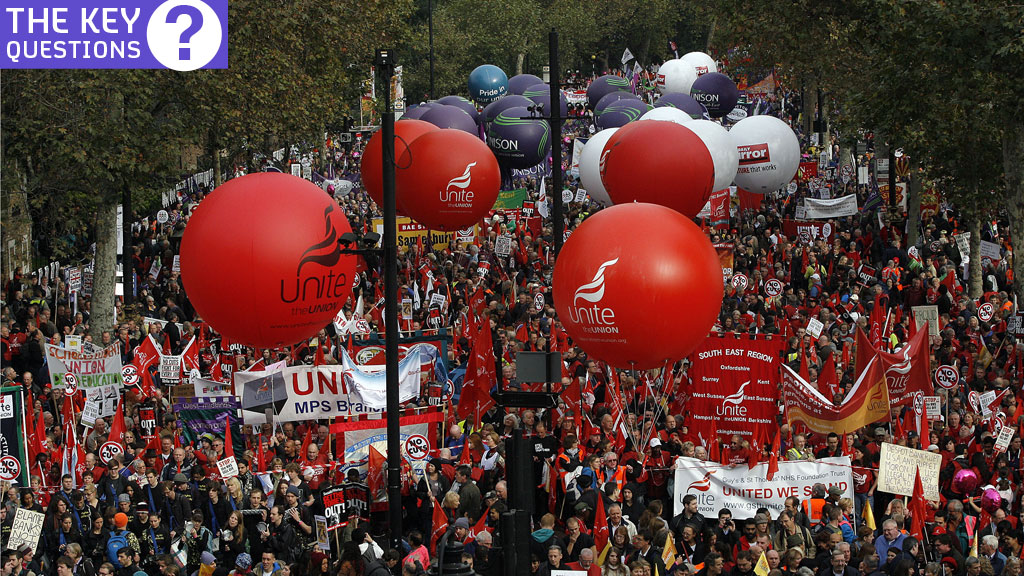Labour and the unions – the key questions
Ed Miliband calls for an “historic” shake-up in Labour’s relationship with the trade unions. What is he hoping to achieve and where does the public stand?

Ed Miliband has been involved in a public spat with Len McCluskey, general secretary of Unite, Britain’s biggest union and Labour’s biggest union donor.
The union has been accused of trying to fix the candidate selection contest in the Falkirk constituency by signing up its members to the Labour party without their knowledge, a claim it denies. This has spurred the Labour leader to take action.
What is being proposed?
Ed Miliband’s most dramatic proposal is to end the automatic levy some union members pay to Labour and replace this with voluntary contributions.
In future, instead of having the option of opting out of this levy, union members would have to opt in and would become members of the Labour party in the process.
These contributions are worth around £8m a year to Labour and it is thought that a new opt-in system could cost the party about £5m in lost revenue.
The Labour leader wants limits introduced for parliamentary selection contests, with curbs on how much unions and other organisations can spend.
He also favours a shake-up of party funding, with a cap on donations from businesses, unions and individuals.
Mr Miliband is proposing a system of US-style “primaries” in constituencies, where everyone registered as a Labour supporter, rather than just Labour members, can vote for a candidate to stand in an election.
This arrangement could be introduced in the 2016 London mayoral elections.
Is Ed Miliband Labour leader because of union votes?
In the 2010 Labour leadership election, Ed Miliband’s brother David was backed by a majority of Labour MPs, MEPs and party members. But the votes of trade unionists handed Ed a narrow victory.
Although unions are not allowed to include ballot papers and promotional material in the envelopes they send their members, Unite and the GMB enclosed literature supporting Ed Miliband, leading to criticism that they had broken the rules.
Will the proposals help Labour’s electoral prospects?
In his latest commentary, YouGov President Peter Kellner says Labour’s current relationship with the unions did not stop the party from winning three elections in a row under Tony Blair.
But he points out that Mr Blair’s standing with the public – his reputation for toughness – had already been boosted by his willingness to end Labour’s support for the closed shop and tear up clause four of the party’s constitution.
Mr Kellner says that like Mr Blair before him, Mr Miliband now has an opportunity to demonstrate his leadership qualities, but he acknowledges he is involved in a high-risk strategy that could blow up in his face and lead to defeat in the 2015 election.
What does the public think about Labour’s union links?
YouGov polling from July shows that 29 per cent of people believe Ed Miliband is too close to the unions, 22 per cent think he has struck the right balance, and 13 per cent believe he is too distant.
Asked if Labour’s links with the unions are a good thing, 26 per cent say yes, 35 per cent say no, and 23 per cent say they are neither good nor bad.
On the sway unions are perceived to have over the Labour party, 41 per cent say they have a lot of influence, while 33 per cent say they do not.
On funding, 46 per cent say Labour should seek to reduce the amount of money it receives from the unions, while 27 per cent say there is nothing wrong with the party receiving large sums in this way.
How does the public believe parties should be funded?
Political parties often find themselves in hot water because of the way they are funded. Labour is criticised for being heavily reliant on money from the unions, and all of the parties are routinely chastised for accepting donations or loans from rich supporters.
The suggestion is that this money could be buying funders special favours.
YouGov polling from 2012 shows that a majority of people want limits on how much businesses, unions and members of the public can donate to political parties (57 per cent, 59 per cent and 45 per cent respectively). Seventy per cent say people and organisations who donate to parties have too much influence.
If the public are suspicious about the way parties are financed, one option would be to introduce state funding, but the public does not like this suggestion either (59 per cent are opposed, with 20 per cent in favour).
At a time of austerity, it would take a brave political leader to argue for state funding of parties, even though the costs to the taxpayer would be small.
So the likelihood is that the current methods of funding will continue, albeit on a reformed basis, with the inevitable moans from voters that influence is being bought and sold.